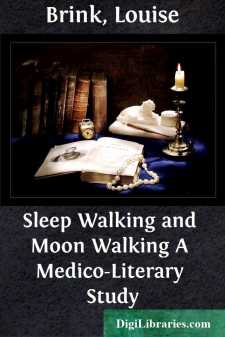Categories
- Antiques & Collectibles 13
- Architecture 36
- Art 48
- Bibles 22
- Biography & Autobiography 813
- Body, Mind & Spirit 142
- Business & Economics 28
- Children's Books 15
- Children's Fiction 12
- Computers 4
- Cooking 94
- Crafts & Hobbies 4
- Drama 346
- Education 46
- Family & Relationships 57
- Fiction 11828
- Games 19
- Gardening 17
- Health & Fitness 34
- History 1377
- House & Home 1
- Humor 147
- Juvenile Fiction 1873
- Juvenile Nonfiction 202
- Language Arts & Disciplines 88
- Law 16
- Literary Collections 686
- Literary Criticism 179
- Mathematics 13
- Medical 41
- Music 40
- Nature 179
- Non-Classifiable 1768
- Performing Arts 7
- Periodicals 1453
- Philosophy 64
- Photography 2
- Poetry 896
- Political Science 203
- Psychology 42
- Reference 154
- Religion 513
- Science 126
- Self-Help 84
- Social Science 81
- Sports & Recreation 34
- Study Aids 3
- Technology & Engineering 59
- Transportation 23
- Travel 463
- True Crime 29
Sleep Walking and Moon Walking A Medico-Literary Study
by: Louise Brink
Categories:
Description:
Excerpt
Sleep walking or night wandering, known also by its Latin name of noctambulism, is a well-known phenomenon. Somnambulism is not so good a term for it, since that signifies too many things. In sleep walking a person rises from his bed in the night, apparently asleep, walks around with closed or half opened eyes, but without perceiving anything, yet performs all sorts of apparently purposeful and often quite complicated actions and gives correct answers to questions, without afterward the least knowledge of what he has said or done. If this all happens at the very time and under the influence of the full moon, it is spoken of as moon walking or being moonstruck.
Under the influence of this heavenly body the moonstruck individual is actually enticed from his bed, often gazes fixedly at the moon, stands at the window or climbs out of it, “with the surefootedness of the sleep walker,” climbs up upon the roof and walks about there or, without stumbling, goes into the open. In short, he carries out all sorts of complex actions. Only it would be dangerous to call the wanderer by name, for then he would not only waken where he was, but he would collapse frequently and fall headlong with fright if he found himself on a height.
Besides there is absolute amnesia succeeding this. Upon persistent questioning there is an attempt to fill in the gaps in memory by confabulation, like the effort to explain posthypnotic action. Furthermore, it is asserted that a specially deep sleep always ushers in night wandering, that indeed the latter in general is only possible in this condition. It is more frequent with children up to puberty and throughout that period than with adults. At the same time the first outbreak of sleep walking occurs often at the first appearance of sexual maturity. According to a widespread folk belief sleep walking will cease in a girl when she becomes pregnant with her first child.
It seems to me that practically no scientific treatment of this problem exists. Modern psychiatry, so far as it takes a sort of general notice of it, contents itself, as Krafft-Ebing does, with calling night wandering “a nervous disease,” “apparently a symptomatic manifestation of other neuroses, epilepsy, hysteria, status nervosus.” The older literature is more explicit. It produces not only a full casuistic but seeks to give some explanation aside from a reference to neurology. So, for example, the safety in climbing upon dangerous places finds this explanation, that the sleep walker goes there with closed eyes and in this way does not see the danger, knows no giddiness and above all is in possession of a specially keen muscular sense.
The phenomena of sleep walking and moon walking must be acknowledged, as far as I can see, almost entirely as pathological yet connected or identical with analogous manifestations of normal profound sleep. The dreams in such sleep, in contrast with those of light sleep, are characterized by movements. These often amount merely to speaking out, laughing, weeping, smacking, throwing oneself about and so on, or occasionally to complicated actions, which begin with leaving the bed. Further comparison shows the night wandering as symptomatically similar to hysterical and hypnotic somnambulism. This interpretation might be objected to upon the ground that unfortunately we know nothing of the origin of the motor phenomena of the dream and that understanding of the hysterical and hypnotic somnambulism is deplorably lacking. Still less has science to say about the influence of the moon upon night wandering. The authors extricate themselves from the difficulty by simply denying its influence....


